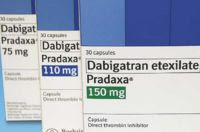PROGRESS IN THE NEWS – VIDEO & ARTICLE:
In the lab, Alzheimer’s was delayed by FDA-approved “Dabigatran” (Pradaxa®), commonly used to clear blood clots. Can this new link in blood & brain research lead to better treatment for both?
A research team at the University of Rhode Island will be undertaking a Phase-1 Clinical Trial evaluating the effects of dabigatran, also known by its brand name, Pradaxa, on the vascular system’s role in Alzheimer’s. Generic dabigatran is FDA-Approved and is also known by its brand name, Pradaxa.
Three Alzheimer’s Research Teams
Another team of scientists at the Centro Nacional de Investigaciones Cardiovasculares (CNIC) identified this possible treatment for Alzheimer disease. Working together with yet another scientific team at The Rockefeller University in New York, the investigators have shown that treatment with the oral anticoagulant dabigatran delays the appearance of Alzheimer’s disease in mice.
The results published in the Journal of the American College of Cardiology (JACC) show that after a year of treatment with dabigatran, mice had no memory loss and no reduction in cerebral circulation. This treatment also reduced typical Alzheimer symptoms, including cerebral inflammation, blood vessel injury, and amyloid protein plaques.
Dabigatran Slows Alzheimer’s Progression
Alzheimer disease is a form of dementia that affects more than 30 million people worldwide. Research in recent years has linked the disease to a reduction in the cerebral circulation; this results in an insufficient supply of nutrients and oxygen to brain cells, leading to their death. Alzheimer disease is also known to be a multifactorial disorder linked to an underlying chronic prothrombotic state. The present study combined physiological and molecular studies to demonstrate that long-term anticoagulation with dabigatran effectively slows disease progression in a transgenic mouse model of Alzheimer disease.
Population aging is predicted to result in a three-fold increase of the number of Alzheimer patients by 2050. A new case of the disease is diagnosed every 3 seconds, and unfortunately the treatments available today only provide a temporary respite from the advance of memory loss and do not stop disease progression or reverse the symptoms.
Fewer Side Effects
Dabigatran is more effective and has fewer side effects than classical anticoagulants and is approved for the treatment of several diseases. Study coordinator Dr. Marta Cortés Canteli, a CNIC researcher funded through the Miguel Servet program, highlighted the value of the study; “This discovery marks an important advance toward the translation of our results to clinical practice to achieve an effective treatment for Alzheimer disease.”
Discussing the implications of the study in more detail, Dr. Cortés Canteli explained that “winning the battle against Alzheimer disease will require individualized combination therapy targeting the various processes that contribute to this disease. One goal is to improve the cerebral circulation, and our study shows that treatment with oral anticoagulants has the potential to be an effective approach in Alzheimer patients with a tendency to coagulation.”
Links Between Brain & Heart
Placing the study in a broader context, Dr. Valentín Fuster, CNIC General Director and a lead author on the study, commented that “neurodegenerative diseases are very closely linked to disease in the cerebral blood vessels. The study of the links between the brain and heart is the major challenge for the next ten years.”
Further studies are needed in patients, but the research team believe that dabigatran has the potential to normalize cerebral blood flow in Alzheimer patients. “An individualized treatment strategy such as this will first require the development of a diagnostic tool to identify those Alzheimer patients with a tendency to coagulation. This will be an important line of research in the coming years,” indicated Dr Cortés Canteli.
Long-Term Dabigatran Treatment Delays Alzheimer’s Disease Pathogenesis in the TgCRND8 Mouse Model,
Marta Cortes-Canteli, Anna Kruyer, Irene Fernandez-Nueda, Ana Marcos-Diaz, Carlos Ceron, Allison T. Richards, Odella C. Jno-Charles, Ignacio Rodriguez, Sergio Callejas, Erin H. Norris, Javier Sanchez-Gonzalez, Jesus Ruiz-Cabello, Borja Ibanez, Sidney Strickland and Valentin Fuster; vol. 74 no. 15 1910-1923
DOI:
https://doi.org/10.1016/j.jacc.2019.07.081
SUPPORT:
- The study began in the US 6 years ago, with North American funding. Completion of the study in Spain was possible thanks to support from several national and European agencies that allowed Dr. Cortés Canteli to bring her research to Spain in 2015.
SOURCE:
-
About the CNIC:
The Centro Nacional de Investigaciones Cardiovasculares (CNIC), directed by Dr. Valentín Fuster, is dedicated to cardiovascular research and the translation of knowledge gained into real benefits for patients. The CNIC, recognized by the Spanish government as a Severo Ochoa center of excellence, is financed through a pioneering public-private partnership between the government (through the Carlos III Institute of Health) and the Pro-CNIC Foundation, which brings together 12 of the most important Spanish private companies.












Encouraging to see our continuing to focus on the underlying issue of hypoperfusion as a route causal factor in the etiology of dementia. There are however, less invasive, safer, more immediately and easily deployed means to influence hypoperfusion I.e., transcranial photobiomodulation. Our current expanded feasibility clinical trial with early to mid stage dementia is study this finding in a home-based self-administered twoce daily, 6-minute protocol
http://Www.quietmindfdn.org .